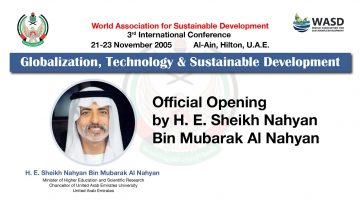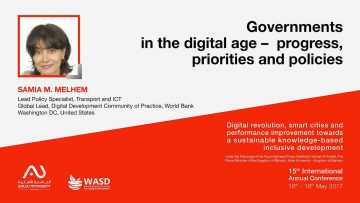Marketing, Entrepreneurship & Society in MENA
Marketing, Entrepreneurship and Society in the Middle East and North Africa (MENA)
 This edited book on Marketing, Entrepreneurship and Society in the Middle East and North Africa (MENA) offers both introspections and retrospections on the role of marketing and entrepreneurship in shaping the Middle Eastern identities within their indigenous Middle Eastern contexts. It treats marketing and entrepreneurship systems as social systems – each system possessing its own unique identity boasting both temporal and spatial characteristics and in which no particular epistemology prevails as an exclusive account of knowledge. The book puts together, for the first time, original and cutting-edge contributions aimed at illuminating and charting new directions for researching, teaching and understanding of this subject matter.
This edited book on Marketing, Entrepreneurship and Society in the Middle East and North Africa (MENA) offers both introspections and retrospections on the role of marketing and entrepreneurship in shaping the Middle Eastern identities within their indigenous Middle Eastern contexts. It treats marketing and entrepreneurship systems as social systems – each system possessing its own unique identity boasting both temporal and spatial characteristics and in which no particular epistemology prevails as an exclusive account of knowledge. The book puts together, for the first time, original and cutting-edge contributions aimed at illuminating and charting new directions for researching, teaching and understanding of this subject matter.
In order to assess the suitability of submissions, authors are required to submit an abstract (100–150 words maximum) which concisely and clearly outlines the purpose, methodology, findings, contribution, limitation as well as practical implications (if applicable) of the chapter. Please consult the Guidelines for Authors before submitting your abstract/chapter. Manuscripts, in the first instance, should be forwarded to Janet Snow (Janet.Snow@wasd.org.uk).
Deadline for abstract submission: 5 December 2020
Deadline for FULL chapter submission: 20 December 2020
- to explore marketing (both as a commercial activity and as an intellectual pursuit) within the context of MENA in ways that capture the different myths and realities of the discipline in the contexts of diverse cultural environments;
- to shed light on the fundamental Middle Eastern socio-cultural characteristics and historical settings of marketing and entrepreneurship and the implications not only in assessing marketing and entrepreneurship programmes but also in capturing the temporal, spatial and other contexts of marketing and entrepreneurship behaviour which have not been adequately accommodated in the available literature;
- to unveil concepts that can illuminate current marketing and entrepreneurship institutions and practices in MENA in a macro perspective, thereby enriching and cultivating the basis for the subject as it evolves into new eras and domain;
- to provide the basis for understanding how the nuts and bolts of marketing and entrepreneurship thought and practice may be applied to MENA contexts;
- to promote an understanding of the various context-specific relationships which exist in marketing and entrepreneurship situations in MENA and recognise their importance to the way in which marketing and entrepreneurship activities/strategies are designed
- to consider the important constraints on marketing and entrepreneurship activities in MENA and the way in which organisations should respond to their potential impacts;
- to enable a better understanding of contemporary marketing and entrepreneurship situations in MENA through the application of relevant and where necessary new marketing and entrepreneurship theories and models.
- to promote an understanding of the various context-specific relationships which exist in marketing and entrepreneurship situations in MENA and recognise their importance to the way in which marketing and entrepreneurship activities are designed.
The book is divided into three sections – organised around four parameters which essentially reflect the marketing and entrepreneurship efforts in MENA. The divisions are intended to allow for both ease of comprehension as well as reflection.
Section 1 (Marketing and Entrepreneurship and the MENA Environment) concentrates on the historical, institutional and process issues which embed marketing and entrepreneurship in MENA. These impact upon theory development and/or re-conceptualisations, allowing for a systemic overview of marketing and entrepreneurship practices and strategies based upon institutional analysis of marketing and entrepreneurship systems as social systems.
Section 2 (The Role of Relationships) examines the nature of interrelationships with respect to a range of players that contribute to market dynamics. This will clearly concern consumers as well as suppliers, distributors, employees, the wider public and society at large. Understanding how relationships are formed and maintained should enable a more efficient allocation of resources; market opportunities and constraints may also stem from an analysis of market relationships.
Section 3 (Context and Strategy) explores the context-specific dimensions of the relationship between marketing, entrepreneurship and society in MENA. The context in which organisations operate is fundamental to the way in which marketing and entrepreneurship operations are instituted. The nature of the industry, market or organisation may well set certain boundaries within which marketing and entrepreneurship strategies have to be developed. As the domains of marketing and entrepreneurship have expanded, certain general approaches as to how various societal characteristics influence marketing and entrepreneurship behaviour have to be established. Investigating the contextual issues will provide a better focus for creating a relevant set of marketing and entrepreneurship activities in MENA situation(s).
Suggested topics
- Institutional analysis of marketing and entrepreneurship (theory and practice)
- Macro-marketing environments, causal textures, government policies
- Historiography of marketing and entrepreneurship, contextual discourses of the development of marketing and entrepreneurship thought, market-driven transformations, re-conceptualisation and measures of market orientation
- Roles of marketing and entrepreneurship in sustainable consumption and issues around sustainable development (SD)
- Marketing and entrepreneurship metaphors in transition economies
- Globalisation and cultural movements in consumption
- Marketing, entrepreneurship and economic development
- Export entrepreneurship, international trade and trade relationships
- Marketing and entrepreneurship
- Social issues shaping marketing and entrepreneurship practice; social marketing and entrepreneurship in relation to health poverty alleviation
- Consumer movement; consumerism, greenism and environmentalism
- Culture and ethnicity
- Relationships in the entrepreneurial businesses in MENA
- Marketing and entrepreneurship issues in relation to the Diaspora, challenges in transitional economies
- Marketplace regulation, consumer protection, marketplace integrity measurements and welfares
- Role of Corporate Social Responsibility in managing the nexus between marketing, entrepreneurship and society in MENA contexts
- Spirituality – marketing, entrepreneurship and religion
- Marketing and entrepreneurship – science and technology trajectories
- The Ethics of marketing and entrepreneurship in MENA
- Marketing and entrepreneurship contribution to quality of life and economic well-being (e.g. freedom of choice in consumption, delivery of standard of living, mass market efficiencies, infrastructure development, international development, social/psychological benefits of marketing and entrepreneurship)
- Sector-specific marketing, entrepreneurship and society issues (e.g. agriculture, banking and finance, education, ICT, knowledge management, etc.)
- Marketing and entrepreneurship tactics (marketing mix variables – applications and impacts).
- Entrepreneurship research and studies in MENA
- Role of women in business and economic growth and SD in MENA
- Youth advocacy and SD in MENA
- Intra-preneurship in MENA
- Family owned businesses and SME businesses in MENA
- Social enterprise and entrepreneurship in MENA
- Service sector businesses in MENA
- Change management, organizational strategy and strategic planning in an entrepreneurial business in MENA
- Gender issue and values in entrepreneurship in MENA
- Business incubators, entrepreneurship and innovation in MENA
- Role of multilateral institutions in SD in MENA
- Agribusiness management, ecotourism and sustainable tourism development in MENA
- Impact of financial crises and risks of innovation sustainability on SMEs in MENA
Pedagogical Features:
In keeping with the high standards of books that also serve as texts for student and research audiences this text intends to overcome many of the weaknesses that are ascribable to many texts such as being densely conceptual. These weaknesses have often made them unsuitable for class-room usage at both undergraduate and post graduate levels. This text therefore intends to subscribe to the following pedagogical considerations:
- Consistency in structure content and general flow will be managed by editors working very closely with contributors to ensure.
- Each chapter contribution will consist of clearly specified aims/learning objectives, properly defined terms and concepts, illustrations that are of real-life/short cases, relevant end of chapter review questions, useful further readings, etc.
- The edited text will as a consequence have a clearer positioning and be more market oriented in terms of the targeted audience needs.
We are very keen to feature country-specific case studies from all countries in the Middle East and North Africa region. We welcome contributions from all senior academics, professional leaders, students, etc. Please check our experts network directory and upload your details here. We are also happy to include your videos in our dedicated YouTube channel.














































